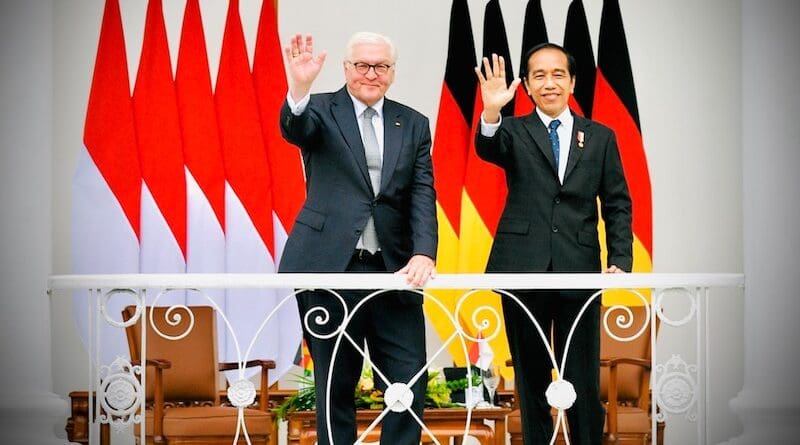Indonesia-Germany Relations In 2024: Strengthening The Brotherhood – OpEd
For years, the alliance of the two nations Indonesia and Germany has just grown and prospered through the years of collaboration, cultural exchange, and commitment to dealing with global issues together. This analytical piece will highlight the themes that the two countries are working towards together, identify any drawbacks or hindrances these countries are facing to get where want to be, and strongly claim how this alliance can only build up and help each other out in a mutual matter.
A healthy and strong economic relationship
Trade and economic relations are one of the crucial pillars of this cooperation. Germany has long been one of Indonesia’s largest trading partners., particularly in sectors such as machinery, automotive components, and chemicals. With the establishment of the business and investment committee in mid 2024 we are going to establish which is a great setting. This committee will consist of representatives from business sectors and governments from both countries and play an important role in this cooperative relationship. It will play a more prominent role in identifying issues that have restricted trade and businesses as well as assisting in removing those barriers and may also help to minimize problems with investment procedures and encourage mutual business alliances which ultimately have the potential to grow these businesses. These efforts are expected to lead to significant growth of trade and investment, thus benefiting both sides.
A united front on international issues
Indonesia and Germany not only share the confidence in imparting new ways of globalization by continuing the good instrument namely the substantial ties with their people, but they are also partners in giving their concerns on some global issues. Indonesia and Germany express the firm position of their credentials on equating development and climate action by acknowledging the adequate instrument called the Bali Partnership and the G7 Action Plan for Sustainable Development and Climate as good initial steps of a long journey both countries have to travel together, Indonesia is ready to take the first but important step in expanding its energy source. That is why Indonesia is inviting Germany to support the technological power, in which Germany takes the world lead, for Indonesia to expand its energy source and to reduce dependence on conventional fuel. You can always anticipate Germany as the partner of Indonesia with the vision of the future. With the power of the economy and its geographic location, Indonesia and Germany also maintain their shared concern on global challenges such as security risks that might impact everyone and marine piracy that is endured by other parties. We believe the joint works of both countries will strengthen peace, stability, and a rule-based order in line with the Seventh Stage and the first four precepts of Pancasila.
Cultural connections form a common ground between Indonesia and Germany for instance. The German language is very well received in Indonesia, particularly by students and professionals. Forging such ties is important in promoting the exchange and at the same time opening opportunities for the educational and professional growth of the Indonesian people in Germany. Continuous support for initiatives that promote German language learning in Indonesia can further the bond.
With the good of both parties moving forward, challenges lie ahead. The remainder of most concern among challenges is the major setback would be the fluctuations of the economy by not knowing possibly less or when to trade on due to the risk of Germany lacking concise information and selling the most due to not understanding the consumer behaviors in the Indonesian economy and visa versa and with one market swinging by the ratio of the difference in currency value on respective nations currency import duties will change the consumer behaviors in bringing export and goods and services from both economies. Secondly, the risk within both parties suffering from political upheaval causing uncertainty for businesses and investors it can be risky to anticipate the timing and continuity of both nation’s governments’ cooperation and trust to do business one format one particular party government has a minimum majority to sustain their existence.
The chance of these risks can also become opportunities for collaboration. The risk will become a reality and could cause High uncertainty for businesses, whereas it was stated earlier to get the timing right on the currency value of Europe and Asia. The greater cross-border cooperation is particularly crucial for the latter which is less integrated in the global economy since Indonesia is not in Europe and most of the world’s trade surplus to date is more in Europe than Asia. To minimize these risks few parties have to agree together or individually to develop/strengthen proper business attitudes to maintain their business continuously at the same pace even if the political governments were changing for a century which hourly would.
Looking on the Bright Side
Looking to the future, the prospects of the partnership between Indonesia and Germany, seem to be bright. The creation of a business and investment committee is a step towards building an economic relationship. Both countries can easily join each other in solving any stumbling blocks to their relationship as the cultural interactions have been lively and the common interest of each other. By addressing the barriers and taking up the emerging opportunities, their alliance seems to be stronger, in years to come, advancing their mutual benefits.
To conclude, the partnership between Germany and Indonesia is a remarkable example of cooperation. It emphasizes growth shared global responsibilities and continual cultural exchange. Both countries have a long successful future together. In 2024 the business and investment committee established represents a turning point in this partnership to make both countries more successful and closer than ever.
The opinions expressed in this article are the author’s own.
References
- https://www.bmas.de/EN/Services/Press/recent-publications/2024/partnership-with-indonesia-strengthened.html
- https://kemlu.go.id/portal/en/read/3595/berita/indonesia-germany-to-strengthen-collaboration-to-
- https://www.auswaertiges-amt.de/en/aussenpolitik/laenderinformationen/indonesien-node/indonesia/233018?e
- https://apnews.com/article/germany-indonesia-defense-ministers-12bc802aaef3926e019903261a88f1d7
- https://www.eurasiareview.com/02022024-indonesia-germany-bilateral-relations-from-2020-2023-an-overview-oped/

